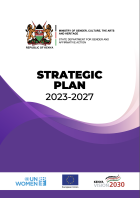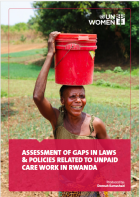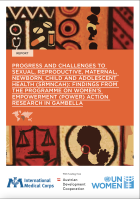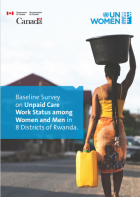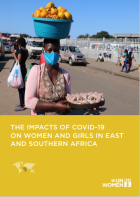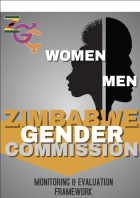1 - 15 of 15 Results
Date:
The 'Gender and water (in)security in agricultural production in East Africa' focuses on the gender dynamics governing access to, use and control over rain water and irrigation used for productive livelihoods in agriculture in the countryside of Ethiopia, Kenya and South Sudan; how rural institutional arrangements and climate change impacts productive water use by women and men in agriculture, how gendered access to irrigation is impacted by the social norms that shape governance structures; and the policy responses needed to equitably respond to these gender challenges.
Date:
The Publication is a detailed strategic plan for the period 2023-2-27. It highlights previous achievements, lessons and emerging issues that define the policy direction of the gender sector achieving a society free from gender discrimination and violence
Date:
This brief emerges from the Assessment of Women's Movement in Africa, and it shows that African states and public institutions are – as a result of the efforts of the women’s movement – increasingly becoming gendered, and a greater number of women are making inroads into the continent’s corridors of power.
Date:
This Regional Coordination Strategy articulates how UN Women will leverage its unique triple mandate—encompassing normative support, UN system coordination, and operational activities—to mobilize urgent and sustained action to achieve gender equality and the empowerment of all women and girls and support the achievement of the 2030 Agenda.
Date:
This report highlights the existing social care infrastructure, and the most needed and cost-effective solutions that can contribute to the reduction and redistribution of unpaid care work in Rwanda.
Date:
The objectives of the gender audit are to document the progress, achievements, and challenges faced by women in the run up and during the 2021 elections and capture actual experiences particularly the impacts of electoral system on women’s political participation and representation in political and electoral processes. The publication captures progress and critical emerging issues experienced in the elections and, highlights the impact of the electoral system on women’s equitable participation in the elections giving recommendations for improving the status quo / electoral processes.
Date:
This Policy Brief will explore the results of the mapping of the women’s movement, and the weaknesses, strengths and recommendations of the current civil-society movement as identified during the National Forum and analysis of the mapping.
Date:
From cooking and cleaning, to fetching water and firewood or taking care of children and the sick and the elderly, women do at least two and a half times more unpaid household and care work than their counterparts. As a result,they have less time to engage in paid labour due to working longer hours,combining paid and unpaid labour.
Date:
29th of June 2022, the electoral law of DRC was enacted by the CENI (National Independent Electoral Commission). Article 13 paved the way for equality in Congolese politics, with new voluntary incentive mechanisms to encourage women's political participation. Nevertheless, the law differs from the practice and women continue to represent only 10% of the National Assembly.
This policy brief will offer a summary of the changes the electoral reform has brought about, and will reflect upon its evolution, achievements, and the likely challenges for the 2023 elections.
Date:
The intention of the book is three-fold: 1) to help those who have not yet made positive behavioral changes by providing motivation and insight, 2) to assist those who are currently attempting to change behaviour, and 3) to serve as a source of hope and support for those who have tried and have taken the decision to change but are still facing challenges.
Date:
UNWomen, in collaboration with International Medical Corps (IMC), has been implementing a Programme on Women’s Empowerment in Sexual, Reproductive, Maternal, Newborn, and Child and Adolescent Health (SRMNCAH) Rights (POWER) in humanitarian settings in Gambella Region. The purpose of the action research is to document the progress on the SRMNCAH programme implemented in the humanitarian setting, lessons learned from it, gaps in it and efforts required for it. The findings will better inform UN Women and partners working in a humanitarian setting on the current progress and the efforts required to improve SRMNCAH services in the refugee and host communities.
Date:
The baseline survey on unpaid care work status among women and men in eight districts of Rwanda seeks to understand the care-related dynamics in households, this study utilized both quantitative and qualitative research methodologies. Drawing on Oxfam’s Household Care Survey (HCS) and the Harvard Analytical Framework (also referred to as the Gender Roles Framework). The survey helps to understand how women, men and children spend their time, how care activities are distributed in the household and the access that households have to basic public services and infrastructure that facilitate their everyday survival. The study also explored the social norms that shape power relations and gender division of care labor.
Date:
This study builds on UN Women’s achievements and experience in supporting women and girls during the COVID pandemic within the East and Southern Africa Region and other parts of the world.
Date:
The ZGC M&E Framework aims to guide gender programmes at the national level and provide guidance on Monitoring and Evaluation.
Date:
The UN Women WCARO annual report aims to share information about the regional office's activities on women empowerment and gender equality in 2020. The said year has been a particularly difficult year around the world with the COVID-19 pandemic. In West and Central Africa (WCA), women and girls were particularly vulnerable to the crisis. To counter these burdens and build medium and long- term recovery measures, the UN Women WCA Regional Office successfully provided multi-faceted assistance...


